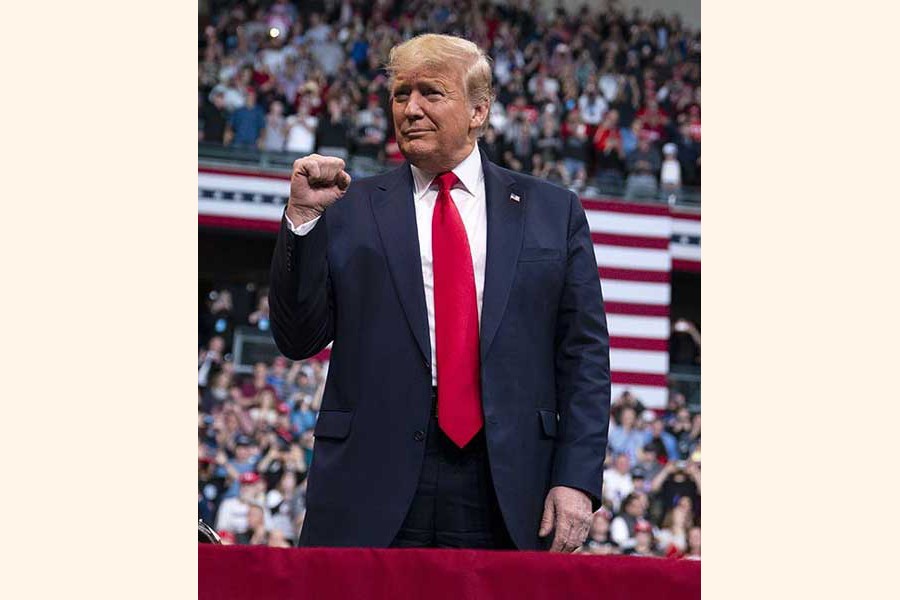The framers of the United States Constitution empowered Congress to remove presidents from office. Article 11, section 4 stipulates that a President "shall be removed from office on impeachment for, and conviction of, treason, bribery, or other high crimes or misdemeanours."
Amidst serious allegation over an "infamous" phone call (July 25, 2019) between President Donald Trump and his counterpart Volodymyr Zelensky of Ukraine, Speaker Nancy Patricia Pelosi declared on September 24, 2019 that the House would initiate a formal impeachment inquiry against the President.
A whistle-blower alleged that President Trump not only abused his official powers seeking Ukraine's support in the 2020 presidential elections for his political benefit but also tried to 'lockdown' evidence around that action, which prompted the impeachment inquiry.
By holding back $US391 million in security aid to Ukraine in a bid to get Kiev to launch a corruption investigation of former US Vice-President Joe Biden, a possible Democratic contender for the November 2020 Presidential elections, Trump alleged to have abused his power.
Earlier, three legal experts had argued that President Trump's pressure on Ukraine to investigate a political rival amounted to impeachable offences. On the other hand, he frequently labelled the impeachment inquiry a 'hoax' and 'witch hunt' by Democrats.
Prior to his impeachment by the House, President Trump also transmitted a six-page letter to Speaker Nancy Pelosi accusing her of "declaring open war on American democracy". But, on December 18, 2019, a determined Pelosi and the Democratic-led House of Representatives voted 230-197, charged Trump with abuse of power in obtaining personal political advantage to the detriment of the national interest.
The House votes were predictably partisan. Only two Democrats voted against the articles of impeachment, Collin Peterson of Minnesota and Jeff Van Drew of New Jersey. The Republican-turned-independent, Representative Justin Amash of Michigan, voted to impeach President Trump on both counts.
Trump insisted that he did not commit any offence in his July phone call with the Ukrainian President. At a rally in Michigan, Trump alleged, "The House Democrats are surrendering the majority, their dignity".
The Senate trial, conducted by John Roberts, Chief Justice of the US Supreme Court, formally began on January 16, 2020. To begin with, the Senate voted 51-49 to defeat the Democrats' efforts in summoning witnesses, such as Trump's former National Security Adviser, John Bolton, who apparently revealed some startling facts regarding the alleged phone call in his forthcoming book.
The result of the US Senate's trial was a highly predictable one as it involved 53 Republicans, 45 Democrats, and two independents. A two-thirds majority vote was required in the 100-member Senate to convict and remove the President from office. Thus, President Trump was cleared of both the impeachment charges as the Republican senators united to defend him. The Senate voted 52-48 to acquit Trump of abuse of power and voted 53-47 to acquit him of obstruction of Congress. In an unprecedented move, Senator Mitt Romney of Utah was the only Republican and a moderate who broke with his party and joined the Democrats in voting to convict Trump.
According to a poll by Insider, thirty-three per cent of Americans agreed on some level with President Trump's acquittal in his Senate impeachment trial and forty-four per cent disagreed.
However, Trump's job approval ratings have remained fairly consistent throughout his presidency. The latest Reuters poll revealed 42 per cent of Americans approved of his performance, while 54 per cent registered in the negative. His main traditional supporters - particularly rural Americans, white people, and evangelical Christians - admire him.
President Trump became only the third president impeached by the House of Representatives in the 230 years of US political history. The other two impeachments were directed against President Andrew Johnson (1868), and Bill Clinton (1998). However, the Senate acquitted both while President Nixon stepped down in 1974 amidst strong public disapproval over the Watergate scandal and before impeachment procedure could begin.
While Trump was triumphant about his acquittal calling it "a day of celebration," and claiming that he did nothing wrong for which he "went through hell, unfairly." The great master of divisive politics used his acquittal to create further polarisation and improve his re-election prospect. Thus, Trump not only maintained that the impeachment trial was a "witch hunt" - but also spoke of various ills he believes have been unnecessarily foisted upon him by the Democrats, including "sleazebag James Comey", and the Russia probe, adding, "It was all bullshit." He repeatedly called Democrats involved in the impeachment "evil," "corrupt" and "vicious and mean."
Analysts believe, even though Senate's impeachment trial has concluded, its political ramifications will linger on till the next US presidential elections. No doubt, the most overriding issue in the 2020 presidential elections would be President Trump as he is desperate for a second term in office. As opinion columnist, Jamelle Bouie, has commented, "Trump, and Trump alone, will be the central issue of the coming election - the core concern for most voters. He's the reason pollsters are predicting high turnout; he's the reason voters on both sides are deeply engaged and ready to take action".
The Trump impeachment saga certainly will impact the 2020 US elections.
Dr Kamal Uddin Ahmed is a former Professor and Chairman of Department of Political Science at the University of Dhaka.
Kamal 112au@yahoo.com


